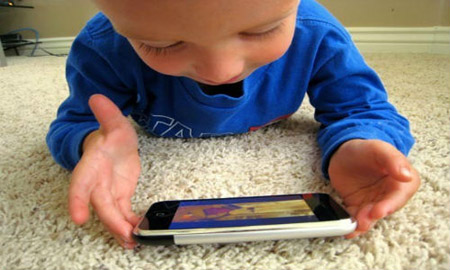
We’ve done our fair share of covering iPads and apps for kids on this site, and for good reason – there are now literally tens of thousands of titles aimed at young children and their insatiable appetites for playing games on smart devices.
As any parent with an iPad can attest the explosive growth of the this industry should come as no surprise – after all, what more justifiable way to keep your restless kids absorbed and entertained than with a touchscreen tablet filled with "educational" games? (And yes, I’m using the term "educational" loosely here).
So now that kids and apps have become as integral a part of modern childhood as TV was for generations past (and present, in many families), it’s also not surprising to see an article like Hanna Rosin’s piece in latest issue of The Atlantic ("The Touch Screen Generation," April 2013). It’s a long one, but very much worth reading. Among the insights:
"… Technological competence and sophistication have not, for parents, translated into comfort and ease. They have merely created yet another sphere that parents feel they have to navigate in exactly the right way. On the one hand, parents want their children to swim expertly in the digital stream that they will have to navigate all their lives; on the other hand, they fear that too much digital media, too early, will sink them. Parents end up treating tablets like precision surgical instruments, gadgets that might perform miracles for their child’s IQ and help him win some nifty robotics competition—but only if they are used just so. Otherwise, their child could end up one of those sad, pale creatures who can’t make eye contact and has an avatar for a girlfriend."
To date, no body of research has definitively proved that the iPad will make your preschooler smarter or teach her to speak Chinese, or alternatively that it will rust her neural circuitry—the device has been out for only three years, not much more than the time it takes some academics to find funding and gather research subjects. So what’s a parent to do?
Despite these common misgivings, Rosin goes on to explain how in spite of the perceived intellectual passivity of electronic media consumption, the "cognitive interactivity" of many educational apps and even certain TV shows (i.e. " Blue’s Clues") can still be construed as "educational" for children – in other words, there’s more to that zombie-like expression your kids get when they’re absorbed in an app (or watching an educational TVshow, for that matter) than meets the eye. Research indicates that in many instances, kids are, in fact, learning from these programs and apps. But questions still remain as to how and why such learning is taking place.
I’ll be the first to admit that, for better or worse, I am as hooked on smart devices as they come – and no parent would wish a full-blown addiction on their children. But, as Rosin points out, I, too, want my children to "swim expertly in the digital stream that they will navigate for the rest of their lives" and if anything, I wish my daughter could actually use and learn from our iPad more.
To explain: Following doctor’s orders we strictly restricted my daughter’s iPad use after she was prescribed corrective lenses for her congenital far-sightedness. It seems that high resolution screens, especially ones with Apple’s much-touted Retina Display, is very bad for young eyes and we were warned against letting her watch TV or use iPads (Rosin’s article interestingly does not even touch on this issue).
This makes perfect sense and we have followed suit, but I can’t help but feel like she’s missing out on some fantastic learning experiences from truly well designed educational apps. Experience tells me that there are indeed a lot of great apps for kids out there and we have used some with our daughter in the past. Of course books and paper shouldn’t be discounted and we continue reading stories and drawing pictures with our daughter the old fashioned way, but the technogeek in me makes me yearn for the opportunity to have my daughter experience and learn from more apps and yes, even some TV shows (the quality ones like Leap Frog and Blues Clues, that is).
Hopefully my daughter’s eyesight will improve over time and we won’t need to be so cautious about her screen time (even now, we do allow her a few minutes here and there) – I’m sure there will be a day when she will be able to swipe away as much as all the other kids. In these regards I fully agree with Rosin’s conclusion: We do indeed live in a screen age and iPads and tablets are here to stay, it’s really up to us adults to determine our own comfort zones when it comes to managing our kids and smart devices – how our kids work it into their own lives is ultimately best left up to them.



